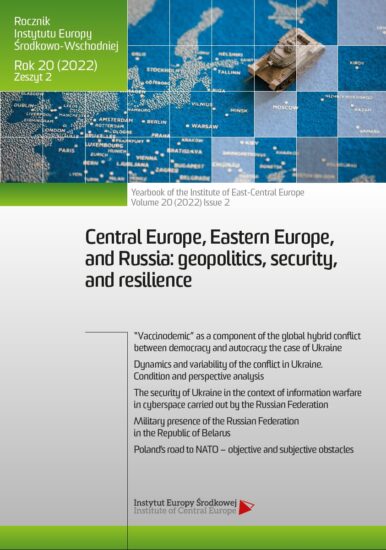Stosunki narodowościowe w państwie totalitarnym. Przypadek Europy Środkowo-Wschodniej pod okupacją sowiecką (1939-1941) – zagadnienia metodologiczne i program badań
Pages: 205-232
Edition: Lublin 2022
DOI: https://doi.org/10.36874/RIESW.2022.2.12
Citation method: M. Wierzbicki, Nationalities relations in a totalitarian state. The case of East Central Europe under Soviet occupation (1939-1941) – methodological issues and a research agenda, Rocznik Instytutu Europy Środkowo-Wschodniej” 20(2022), z. 2, s. 205-232, DOI: https://doi.org/10.36874/RIESW.2022.2.12.
Keywords: East Central Europe, methodological issues, nationalities relations, research agenda, Soviet occupation, totalitarian state
Abstract: The aim of the article is to present the specific nature of research on the issues of national relations in a totalitarian state based on the example of the lands of Central and Eastern Europe under the Soviet occupation from 1939-1941. In order to achieve this, the literature on the subject (in English and Polish) was reviewed as well as the most important methodological problems encountered by researchers. The research program was also outlined, along with a proposal for their conceptualization in the form of signalling the main aspects of the above-mentioned issues, including the specificity of the Soviet occupation of 1939-1941, social and ethnic relations in this area, and the Soviet nationalities policy. Several research methods and postulates were proposed, as well as perspectives and theoretical approaches that could facilitate the study of this complex and controversial subject, e.g., the interdisciplinary nature of research, methods of bottom-up formation of political attitudes of the population (the so-called “bottom-up” method), application of theories of the totalitarian state, and different theories of ethnicity. As a result, an interdisciplinary program of comparative studies of ethnic relations in Central and Eastern Europe under Soviet rule (1939-1941) was outlined, taking into account the transnational character of historical processes and the need to conduct micro historic analyses and case studies that would allow capturing of the diversity of ethnic relations and verify the effectiveness of the policy of the central Soviet authorities. The article argues that it seems obvious that the specificity of the analysed problematics can be properly grasped only by consideration it in the historical and theoretical context, adopting a comparative and transnational approach, from a micro-historical as well as everyday-life perspective that highlights the most important social factors which facilitated changes in interethnic relations.

PDF: Download